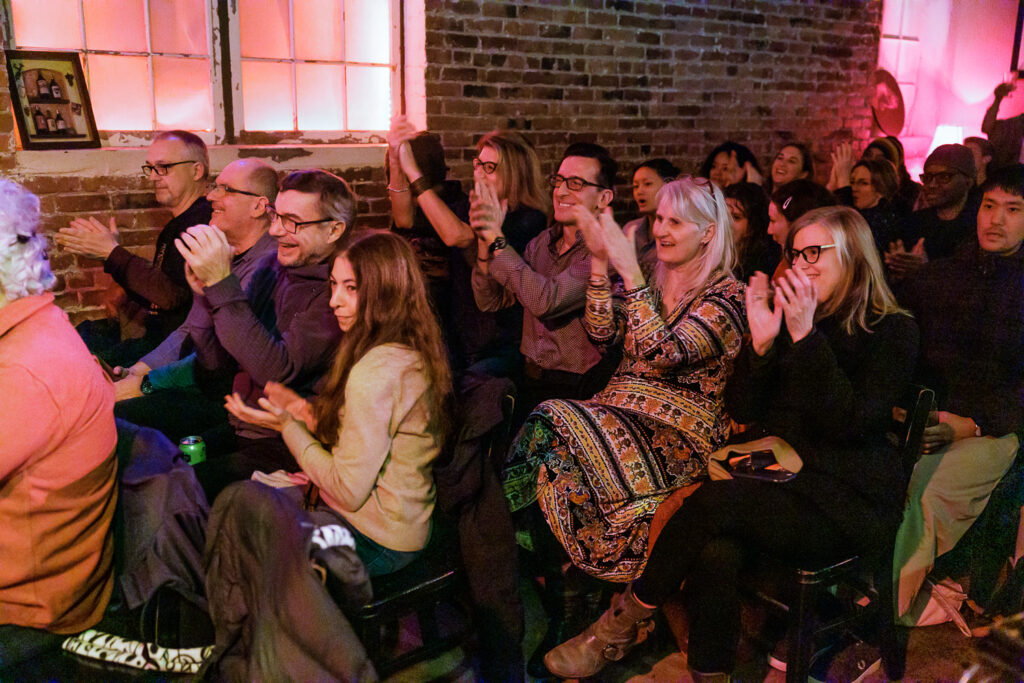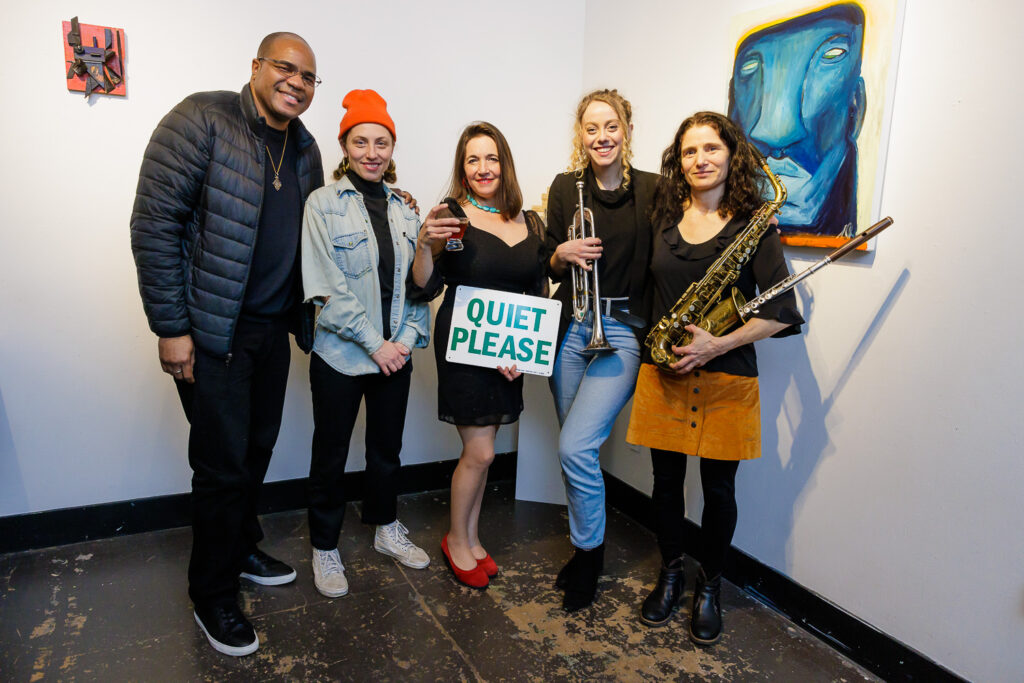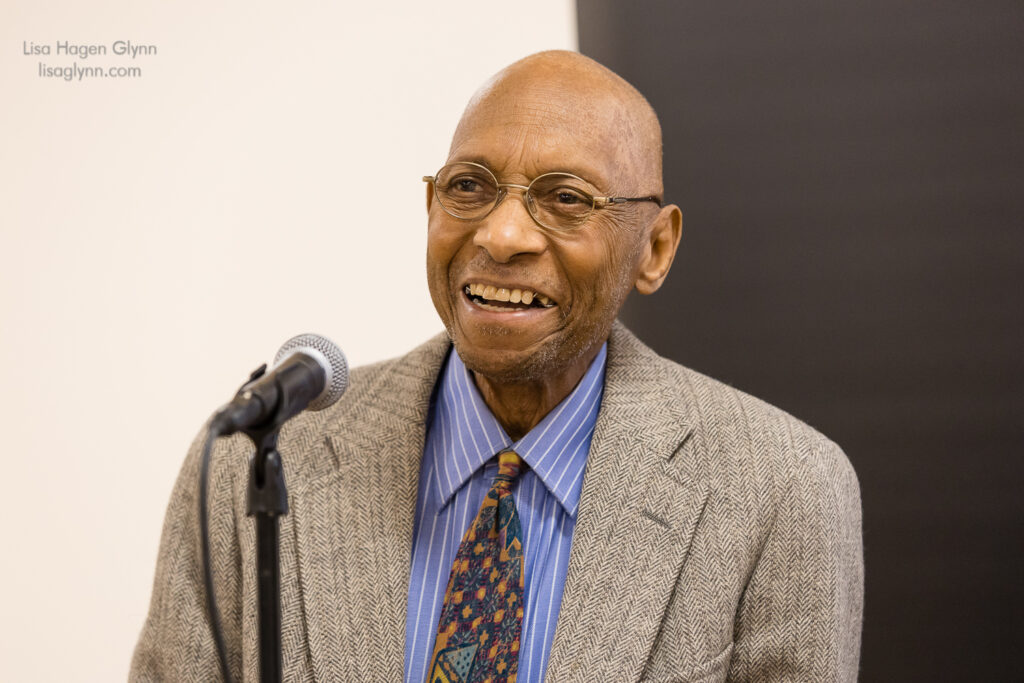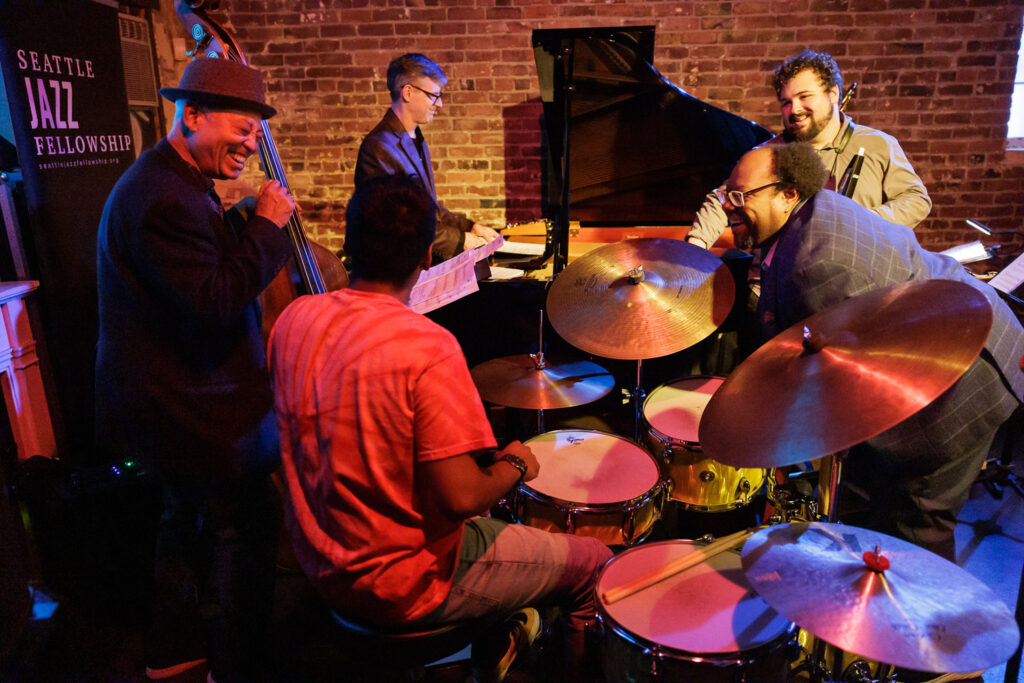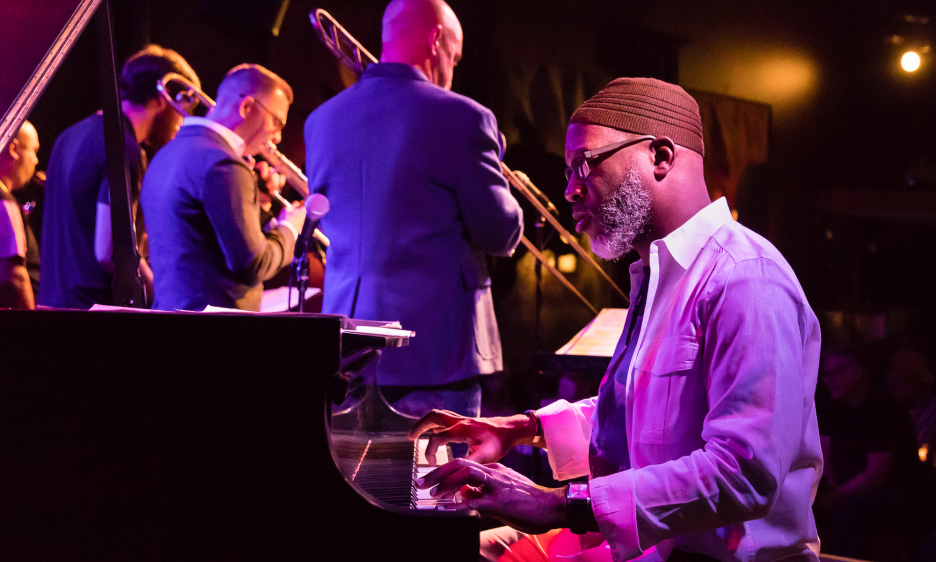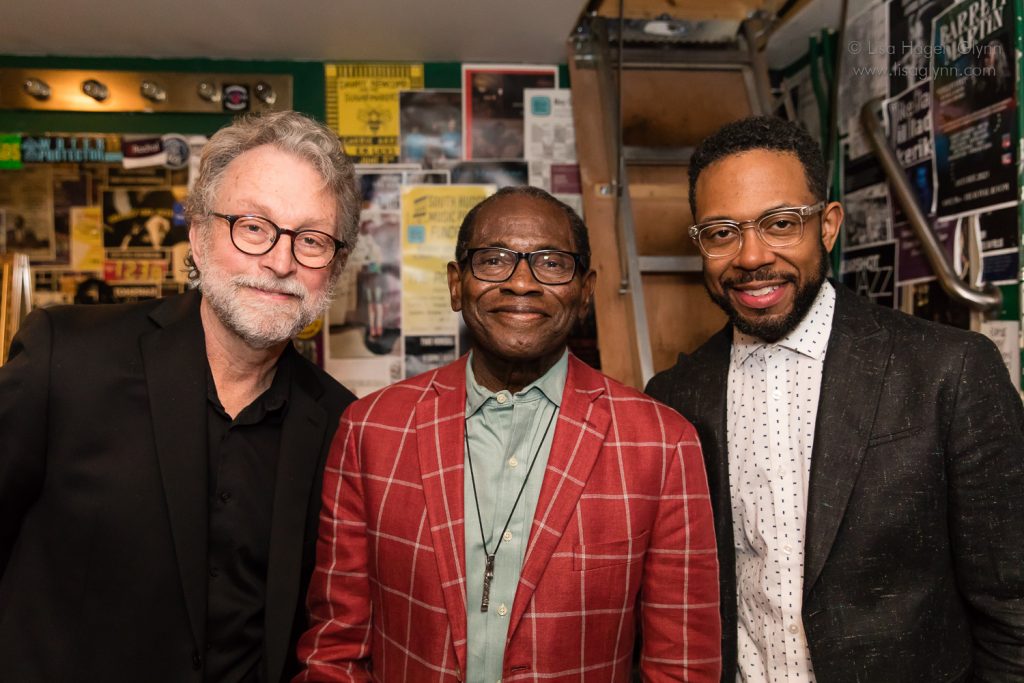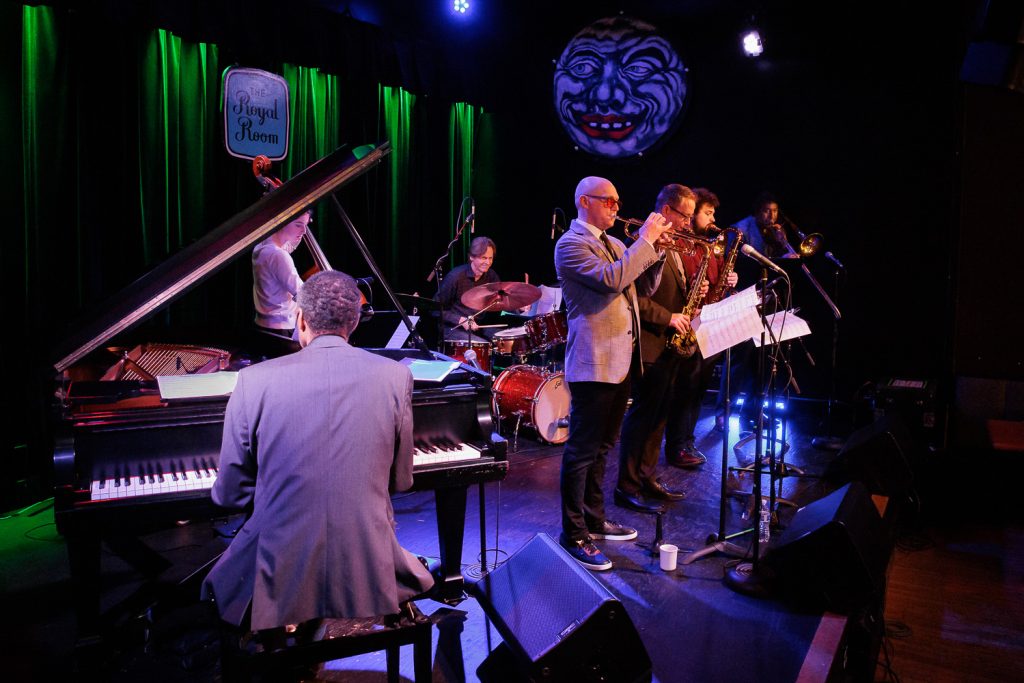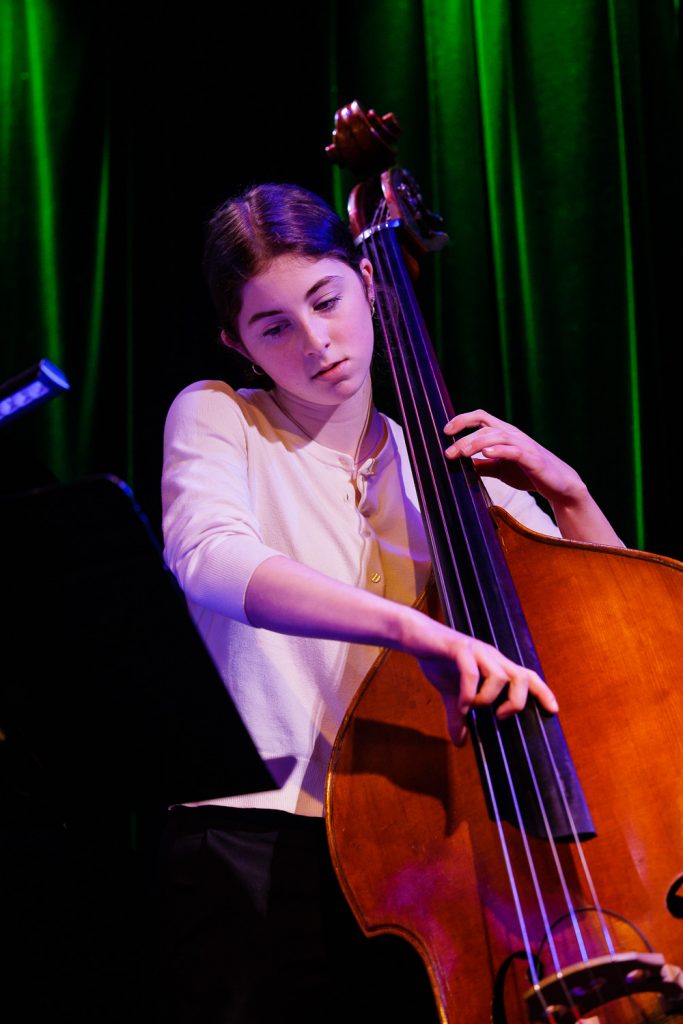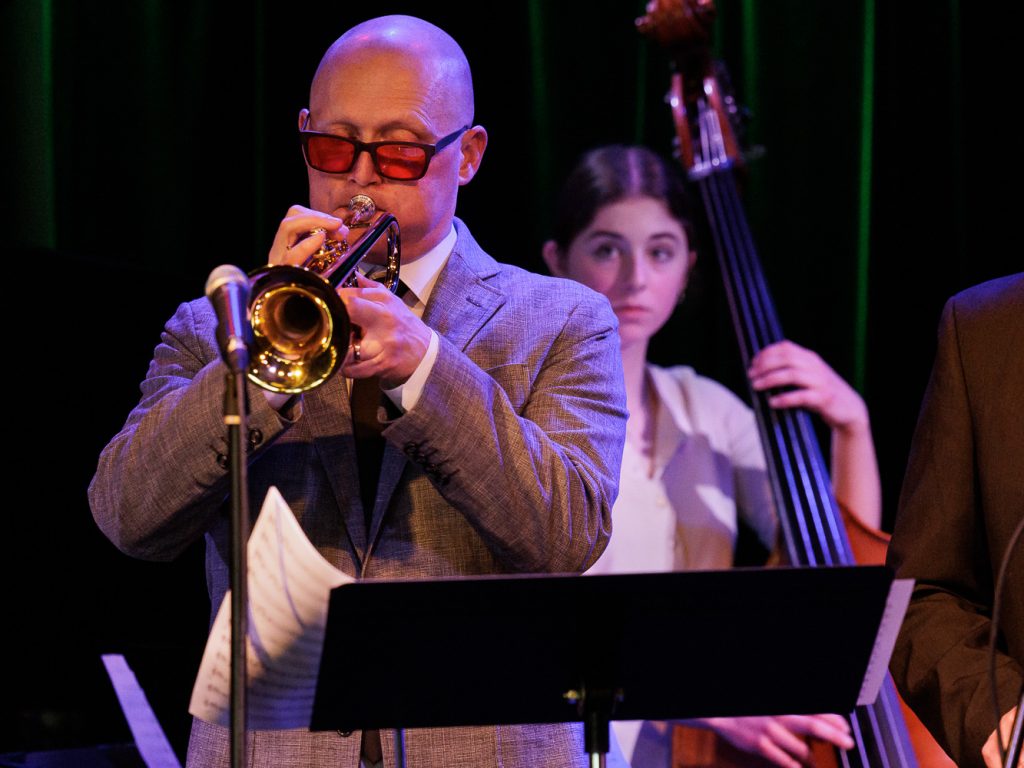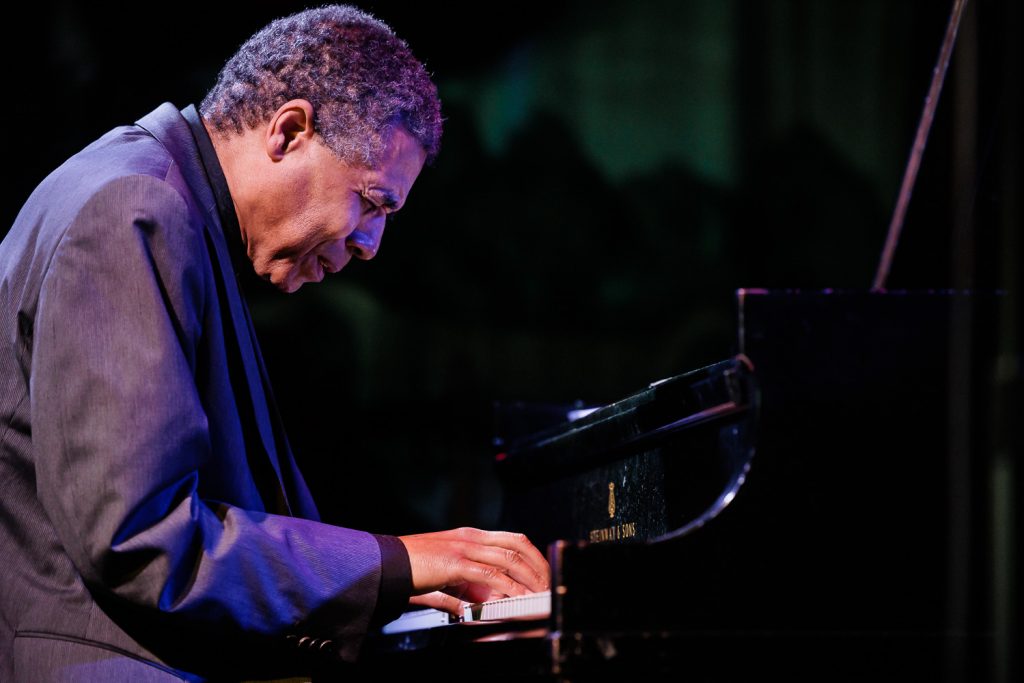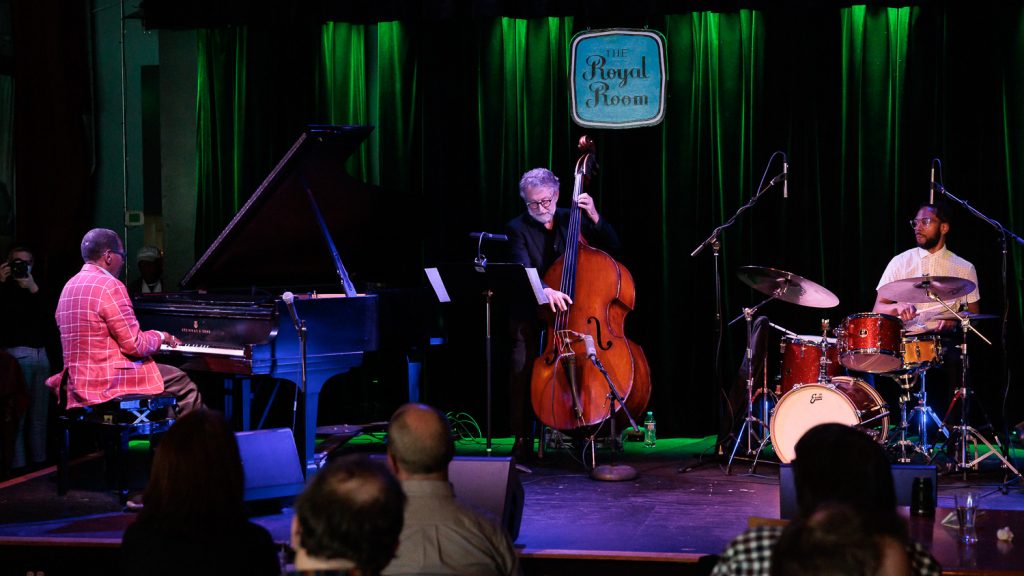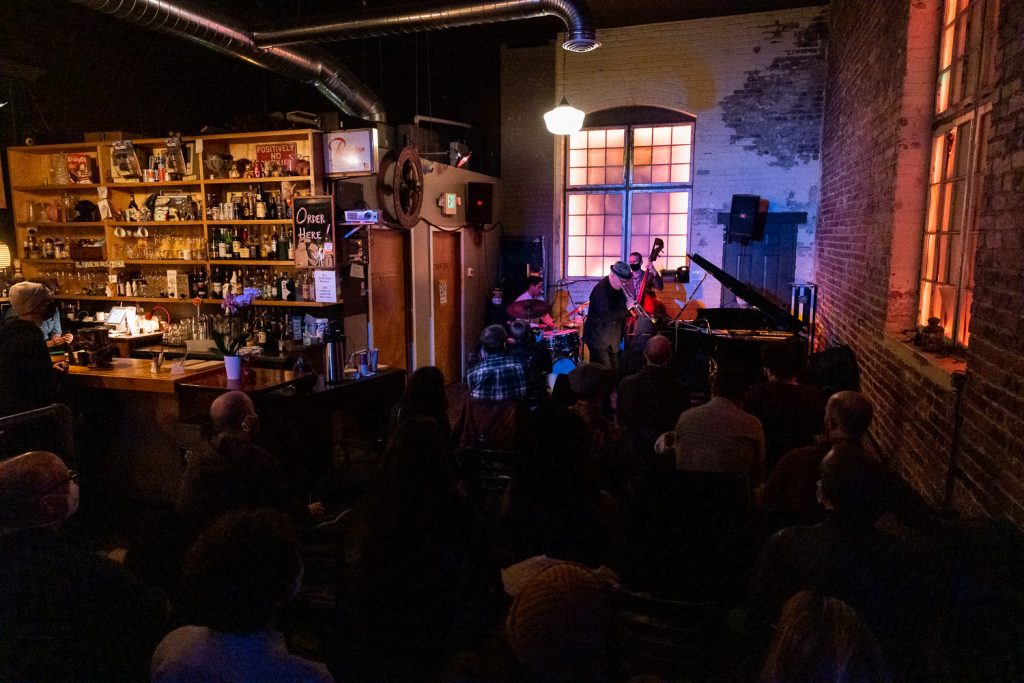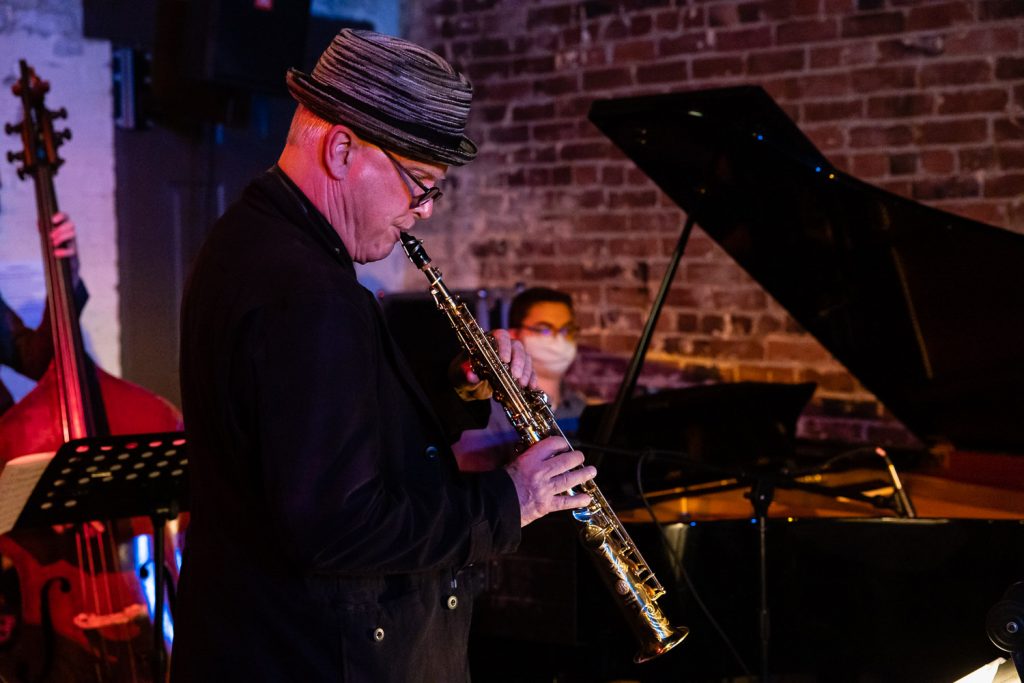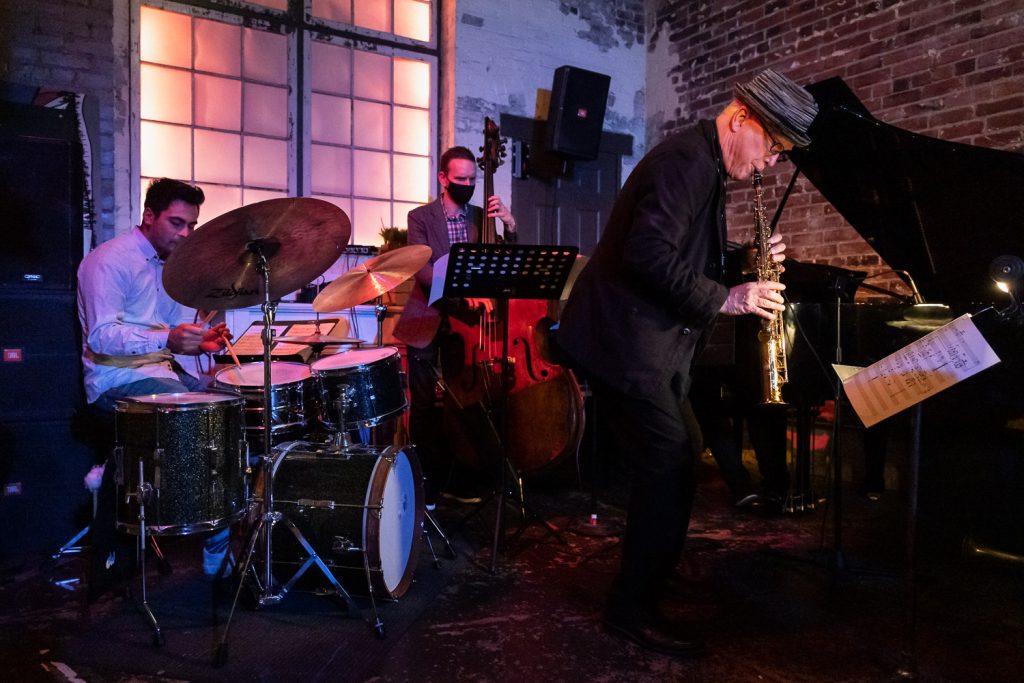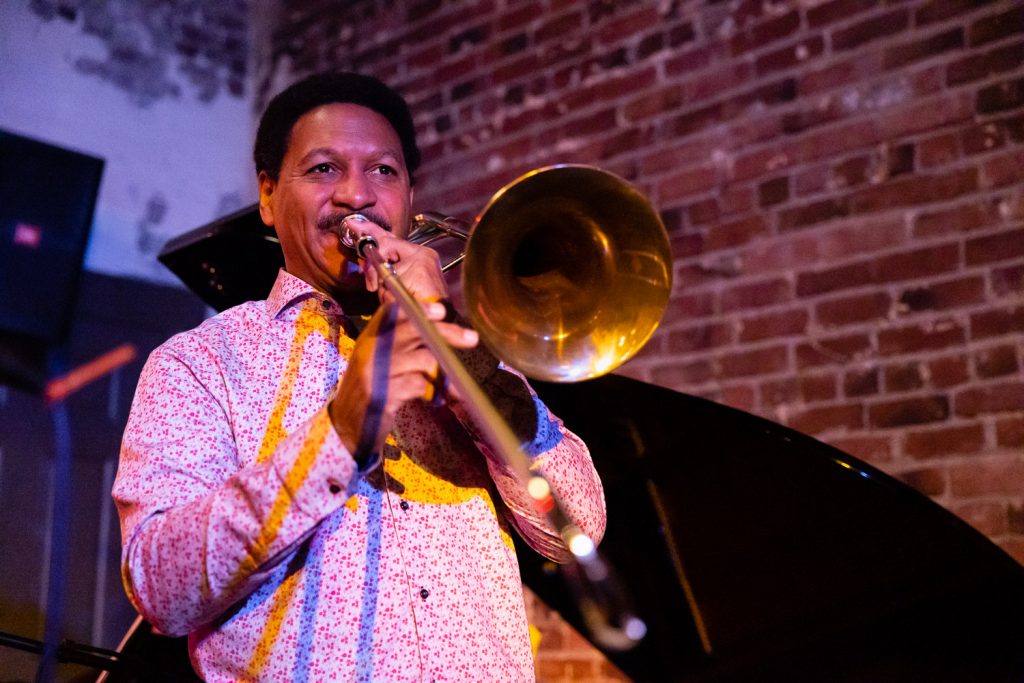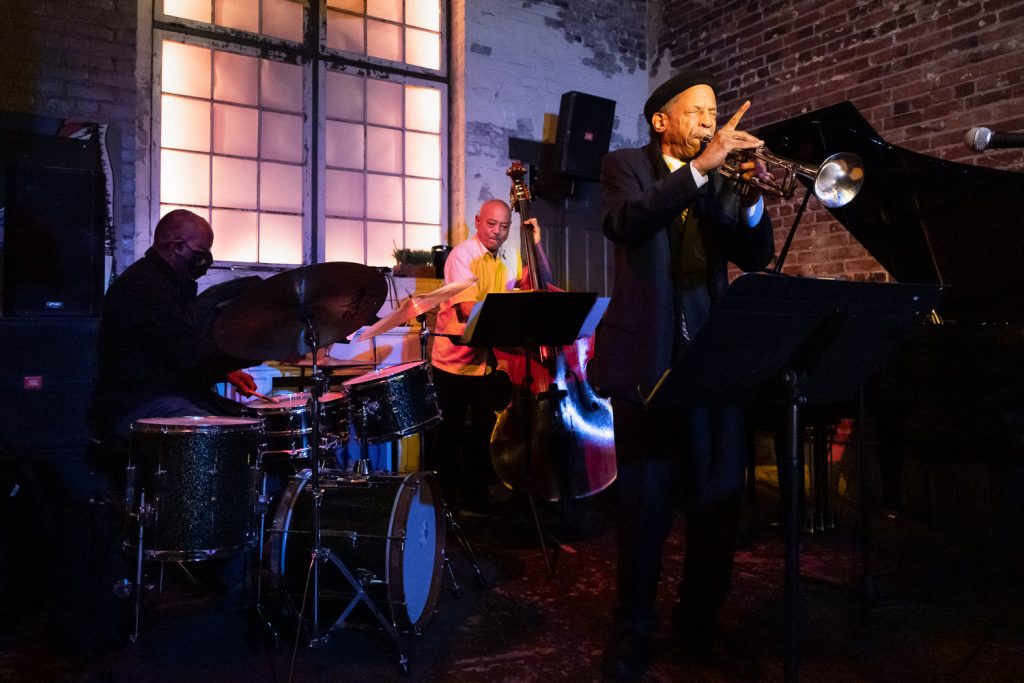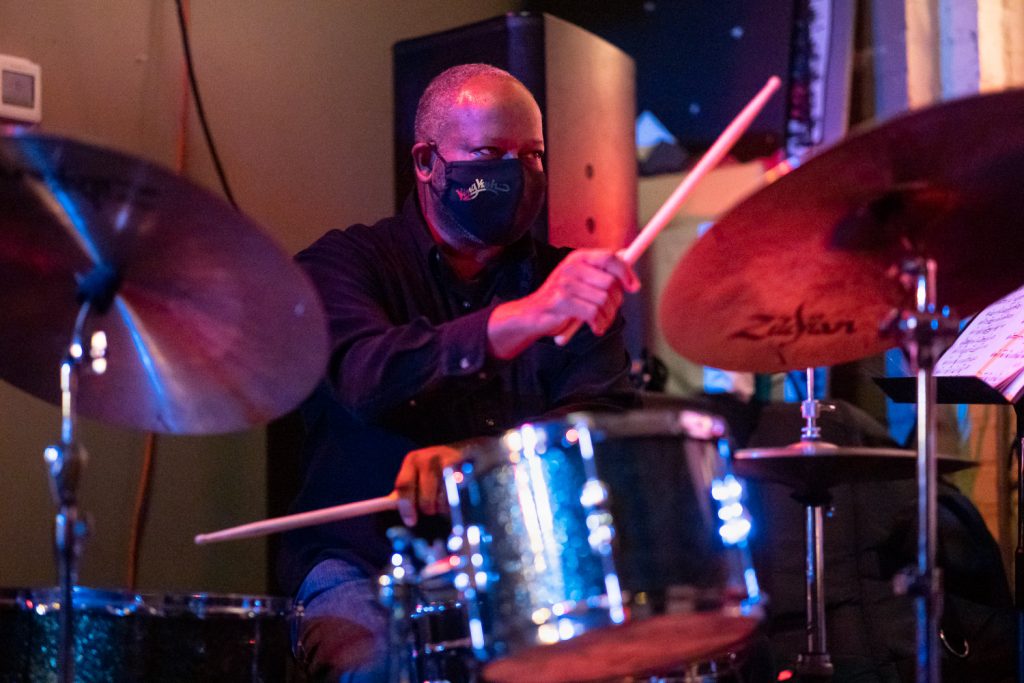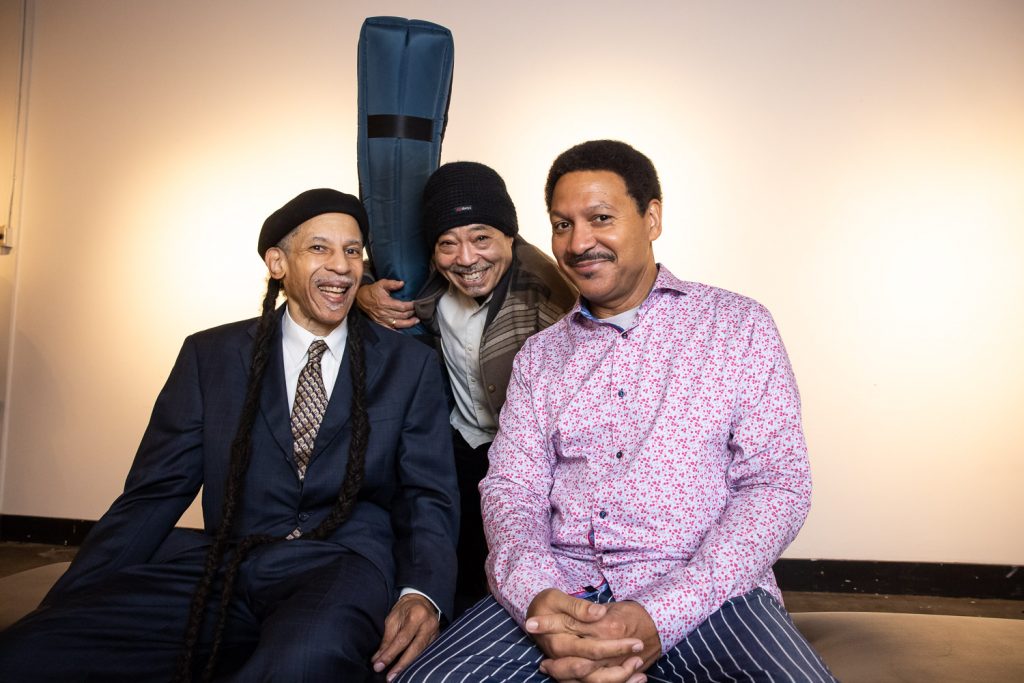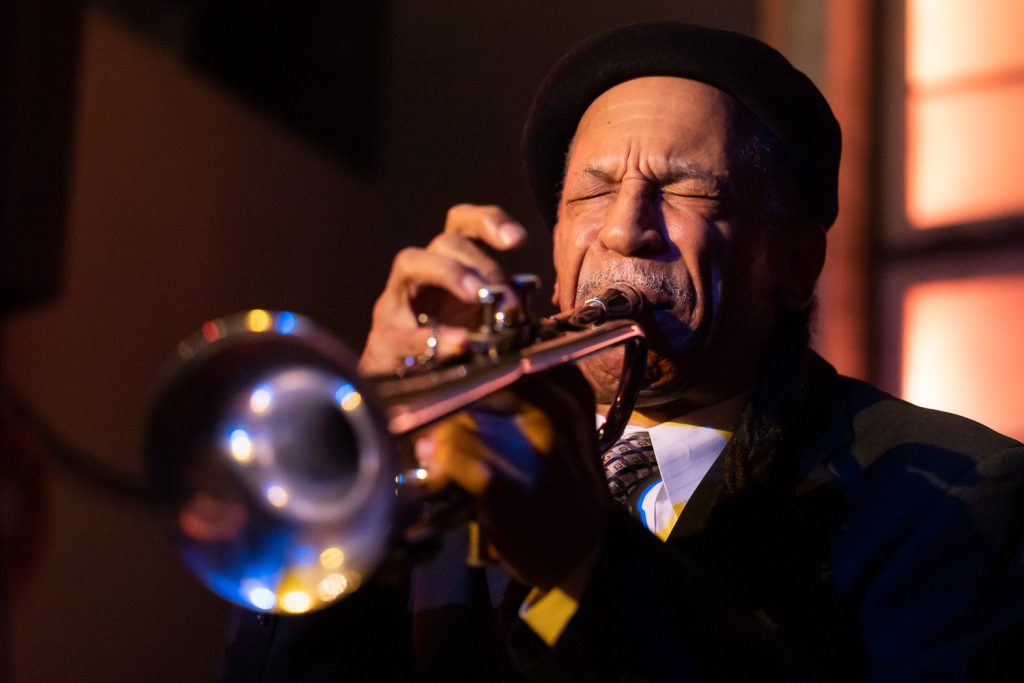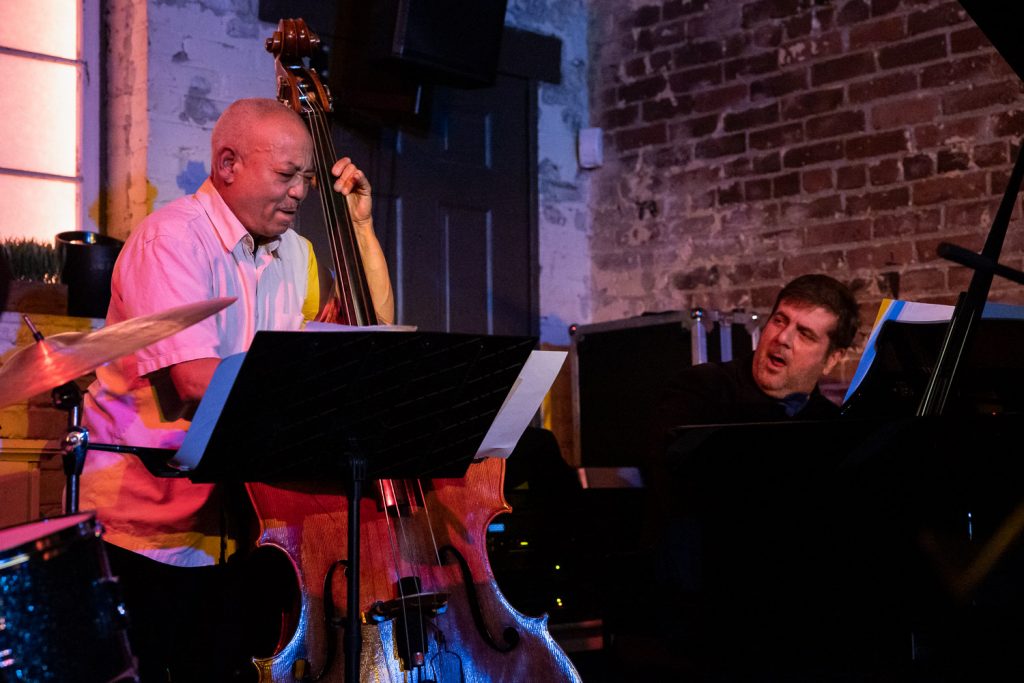Seattle Jazz Scene: Live Jazz Previews for Seattle

Lisa Fischer & Ranky Tanky
Thu July 25- Sun July 28, 7:30 & 9:30 PM / Jazz Alley
Vocalist Lisa Fischer has traveled a long road to prominence. After nearly four decades performing as a backup singer to such legends as Luther Vandross, The Rolling Stones, Chaka Khan and Tina Turner, she has become a shape-shifting vocalist that never quite settles into one, predicatable style. For this Jazz Alley date, she joins Gullah groovemasters Ranky Tanky, a band of lifelong friends from coastal South Carolina that artfully celebrate the traditions originated by African Americans in the coastal South during slavery that continue to present day.
While there is no doubt about Fischer’s prowess as a vocalist, what is truly impressive for this Jazz Alley run is how seamlessly she fits into the groove of this band, and of this music. The music is funky, soulful and passionate–this band is literally bringing Gullah music to the world, now with the indelible talents of Fischer in hand. Personal note: I sat stageside for their performance together last summer at the Detroit Jazz Festival and left the site as a happier person. https://www.jazzalley.com/www-home/artist.jsp?shownum=7551

Jessica Lurie Quintet
Fri July 26, 7:30 PM / Seattle Jazz Fellowship- 109 S. Main St.
Saxophonist/Flutist Jessica Lurie has maintained a level of excellence over the years while moving forward without fear into a variety of musical environments. Her playing is strongly influenced by jazz, fusion, klezmer and rock, and her ability to react within the moment assertively and melodically.
Lurie is a bi-coastal resident these days, between New York and her native digs in the PNW. For this date she teams up with Barcelona born piano star, Marina Albero for a foray into original sounds. Bassist Kelsey Mines, saxophonist Kate Olson and drummer D’Vonne Lewis join to create a band with great familiarity with each other- Lurie’s Seattle crew! All five musicians entered the jazz world through different portals, opening the music up to a variety of intriguing possibilities. The possibilities for an all-star hang is out there as well, a highly recommended evening at 109 S. Main. https://seattlejazzfellowship.org/events

Wayne Horvitz Methodolatry Quartet with Skerik, Geoff Harper & D’Vonne Lewis
Sat July 27, 7:30 PM / Seattle Jazz Fellowship- 109 S. Main St.
Methodolatry denotes an adherence to research methods over interpretation, which is befuddling to music fans looking for meaningful interpretative playing from musicians like Wayne Horvitz and Skerik. Add the fluid adaptability of bassist Geoff Harper and the read and react abilities of drummer D’Vonne Lewis and the interpretation becomes the research. A Saturday night at SJF adds to the attraction here, a fifty seat room with standing room of perhaps twenty. The vibe is a listening environment that is music first. A quartet of this sort deserves that kind of attention. https://seattlejazzfellowship.org/events

109 S. Main St. / Mondays at 7:30 PM
It’s good news to hear that the Seattle Jazz Fellowship will host a jazz jam session on Monday nights. The all ages weekly session will provide that vital opportunity for mentorship between generations of players, and just as importantly, a chance for the Seattle jazz community to gather and just hang out. The weekly tilt is needed to continue the tradition of jazz jam sessions in the city. Not only are Mondays the least active evening for musicians playing gigs, the 7:30 start time should bring in a wider swath of the scene. The all ages component helps as well. If Thomas Marriott’s curation of sessions in the past is any indicator, the session will start with a house band playing a few tunes, and then the session begins. The cherry on top for the new session is that a good piano is employed. Most importantly, it will be FUN!https://seattlejazzfellowship.org/events
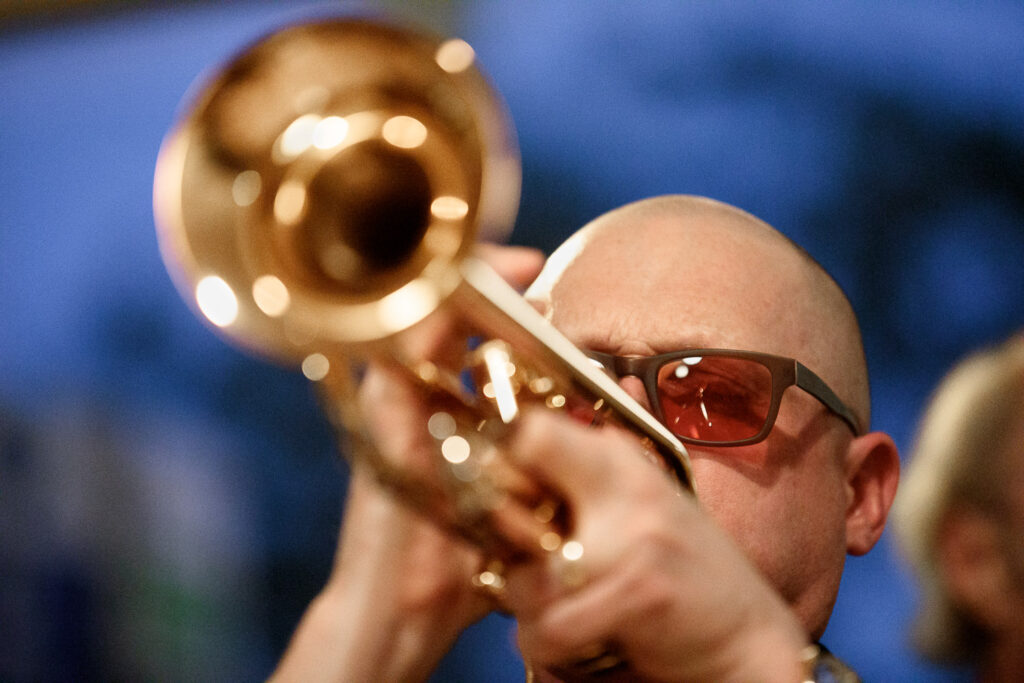
Underground Sounds with Thomas Marriott, Rick Mandyck, Jeff Johnson & John Bishop
Tuesdays 8 PM / Underbelly
Trumpeter Thomas Marriott leads this band of long time mates with a strong intuitive connection. The author of fourteen albums as a leader and a recent inductee into the Seattle Jazz Hall of Fame is joined by the incomparable duo of bassist Jeff Johnson and drummer John Bishop. Saxophonist Rick Mandyck has switched to alto, but bears the sound and approach of some of the great tenor players in jazz. The band plays originals from Marriott, Mandyck and Johnson, along with a few standards. The vibe in the room is relaxed, the drinks are first class and there is a very cute puppy in the house to add to the charm. The house screens classic films and cartoons as well! A highly recommended hang on Tuesday nights.
Underbelly, the quaint cellar bar on First Avenue in Pioneer Square sits directly across the street from what was the New Orleans club, a former hub of local Seattle jazz. That vibe lives on Tuesday nights in the former burlesque venue, with four of the city’s top jazz musicians colliding in an explosive chordless quartet that at times has been known as Free Fall. This is an opportunity to witness great jazz in an informal environment with no cover.

Paul Richardson Trio with Steve Kim & Steven Banks
Thu Aug 1, 7:30 PM / Seattle Jazz Fellowship- 109 S. Main St.
Unless you’re a regular at El Gaucho in Seattle, you may have never heard pianist Paul Richardson, even though he logs more hours than most behind the keyboard. It’s true that if you are out on the Seattle jazz scene as a listener, his gigs in different venues may escape your view. That would make it even more important for you as a jazz fan to hit this date at 109 S. Main. The Seattle Jazz Fellowship is music first, and Richardson will perform with a formidable trio of Seattle music veterans. The difference here is that people will listen without the distraction restaurant and club gigs tend to have.
Richardson is a player with wonderful technique, a great sense of feel for the lyrical value of a tune, and a veteran onstage persona. He is joined by bassist Steve Kim and drummer Steven Banks, two players with some serious Seattle history. One can recall Kim on gigs with Larry Coryell, Carter Jefferson and Jay Thomas to note but a few. His versatility on electric bass has brought him to play with such diverse musical characters as Garth Hudson of The Band. Ditto for Banks, who has gigged with jazz artists Julian Priester, Eddie Harris and Herbie Hancock, and soul legends Donny Hathaway, Peter Tosh and Earth, Wind and Fire.
Richardson over the past decade or so, has not played much at places like Tula’s, The Royal Room, Jazz Alley or for that matter, the three year history of the Seattle Jazz Fellowship. He has largely slipped by that particular mooring. SJF is all about giving Seattle jazz artists a stage, and removing barriers of access to see them. This is a great example of just that. https://seattlejazzfellowship.org/events


Meridian Odyssey
with Noah Halpern, Xavier Lecouturier, Dylan Hayes, Ben Feldman, Martin Budde & Santosh Sharma
Fri & Sat Aug 2-3, 7:30 PM / Seattle Jazz Fellowship- 109 S. Main St.
Meridian Odyssey is a band born in brotherhood in Seattle, bonded during the pandemic in Alaska, and now with two albums to their credit, a bi-coastal phenomena. All from the new wave of jazz excellence in Seattle, the band plays with a group mind that has developed over the relatively short time the six players have been playing professionally. Drummer Xavier Lecouturier, pianist Dylan Hayes and guitarist Martin Budde are virtual stalwarts on the current scene in Seattle. All three have a penchant for composition as well, resulting in recordings on the highly regarded Origin Records label.
Bassist Ben Feldman has been a known quantity in Seattle since his high school days at Garfield. He is now in his fifth year in New York, in the master’s program at Julliard after graduating from the Manhattan School of Music. In the middle of his studies, he is a rising star on the scene in Gotham, His talents have been recently on display at SJF with his work during Lecouturier’s residency and his recent performance with the Friendship Trio. Trumpeter Noah Halpern has a beautiful trumpet sound, a probing and melodic approach to improvisation and an emotive imagination that resonates strongly in the here and now. He recently won The 2023 Carmine Caruso International Jazz Trumpet Solo Competition, a prestigious title indeed. Halpern’s playing and that of frontline mate Santosh Sharma is what makes this band sing when playing at its peak. Sharma’s amazing skillset is technically brilliant without doubt, but is as well in the service of seeking out and finding the beauty and primary emotion of a tune.
This is a weekend not to miss at 109 S. Main. https://seattlejazzfellowship.org/events

KNKX Presents: Kiki Valera y su Son Cubano “Vacilón Santiaguero” Album Release
Fri Aug 2, 7:30 PM / Royal Room
Son Cubano master, Kiki Valera, celebrates the release of his second album since arriving in Seattle. The Cuban cuatro pioneer approaches this music from the eastern hill country of Cuba with a jazz improvisors mind, creating a seamless collision between traditional Son Cubano and modern improvisational forms. It is quite remarkable to have Valera in Seattle, considering his standing as a member of one of the most influential bands of the genre, La Familia Valera Miranda. Seattle’s own Carlos Cascante will be featured on vocals, well known to Latin jazz fans as the lead singer of the Spanish Harlme Orchestra.
It is true that this music is not jazz per se, but it is part of Cuban music that has roots in both Spanish and Bantu traditions. The jazz community has supported Kiki’s music, appreciating not only the tradition and the sound, but the high degree of excellence in his playing and his sheer artistry. https://theroyalroomseattle.com/event/kiki-valera-y-su-son-cubano-vacilon-santiaguero-album-release/

FreeFall with Jeff Johnson
featuring Thomas Marriott, Rick Mandyck & John Bishop
Thu Aug 8, 7:30 PM / Seattle Jazz Fellowship- 109 S. Main St.
Anytime this quartet plays in public, you should take advantage of it. While the band has a weekly date down the block at Underbelly, this appearance comes with the guarantee that the original four–the only true version of this non-chordal juggernaut, will be on the gig. The idea for this band dates back to the 1990’s, when the trio of saxophonist Rick Mandyck, drummer John Bishop and bassist Jeff Johnson covered a Tuesday night gig at the Old Town Ale House in Ballard for eight years. Mandyck had been performing with Billy Hart, Mark Murphy and Carter Jefferson among others. Johnson had played with Philly Joe Jones, Jessica Williams and Hal Galper while Bishop was appearing on dozens of albums and tour dates on a national scale. Multi-reedist Hans Teuber became the fourth frequent participant, while saxophonist Rich Cole and guitarist John Stowell would drop in as well.

The current iteration includes trumpeter Thomas Marriott. The author of fourteen albums as a leader adds a different sonic presence to the band. Johnson and Bishop have since been the groundbreaking presence in Galper’s rubato revolution, and are the tidal force that allows both Mandyck and Marriott to blast off. Unencumbered by chordal harmony, all four players are equal participants in terms of soloing. The format does put great dependence on the abilities of the bassist and drummer, again stating the importance of the foundational presence of original members Johnson and Bishop. The quartet plays originals from Johnson and Mandyck that are open conduits to exploration. Toss in Marriott’s formidable tunes, and adventurous interpretations of standards and you have Free Fall. https://seattlejazzfellowship.org/events

George Colligan
Fri Aug 9, 7:30 PM / Seattle Jazz Fellowship- 109 S. Main St.
Pianist George Colligan is Portland based and world class in every way. Family and a professorship at Portland State brought him here, but the pianist is an on demand player as a sideman and a leader. Originally a classical trumpet major and a drummer to boot, Colligan came to the piano last, and found a medium to play orchestrally. His talents have placed him on tour and in the studio with Jack DeJohnette, Buster Williams, Gary Bartz, Cassandra Wilson, Christian McBride and a host of others.
To see a musician of this status in a small room is a rarity and a great chance for Seattle jazz fans to witness virtuosity up close. Colligan played the SJF weekley at Vermillion in 2023, and the room was full early on this first come, first served event. Same deal down in Pioneer Square, so get there early. Band and program TBAhttps://seattlejazzfellowship.org/events

John Pizzarelli Trio
Thu Aug 8 – Sun Aug 11, 7:30 & 9:30 PM / Jazz Alley
Guitarist and vocalist John Pizzarelli arrives in town toting a trio, and a set list of tunes derived from the stage and screen. If guitar and vocal jazz is your thing, it frankly doesn’t get a lot better than this. Pizzarelli is equally top shelf with both of his crafts, and delivers them intimately with a trio that does not include drums. Pianist J. Thompson and bassist Mike Karn join for this four night, six show run. The veteran guitarist is well known for his career-long deep dive into the Great American Songbook and delivers on that premise with artful precision. No chance of this gig going out on the edge- there is no edge, just a leisurely, brisk drive down the center lane. https://www.jazzalley.com/www-home/artist.jsp?shownum=7558

Jovino Santos Neto Quinteto
Tue & Wed Aug 20 – 21, 7 :30 PM / Jazz Alley
Jovino Santos Neto has been a musical force since arriving in Seattle from his native Brazil. His career-long association with Brazilian music legend Hermeto Pascoal has been a light that he has carried and added to. A brilliant pianist and composer, his quintet is given a proper stage at Jazz Alley. Over decades of time, Jovino’s performances have been dynamic, virtuosic and highly on point in terms of being a sure thing.
Jovino is joined by drummer Mark Ivester, percussionist Jeff Busch, vibraphonist Ben Thomas and bassist Tim Carey. The tenure of the band has built a precision and ease that can only be honed with time and love. The partnership between Ivester and Busch is a true connection that acts as one mind. Thomas and Jovino have a special voice on voice collective spirit that fronts the band’s unique sound. Carey was given the unenviable task of taking over the bass duties of the band upon the passing of the great Chuck Deardorf. His work on electric bass has not only been excellent, he has gathered the spirit of the music and become a driving force. https://www.jazzalley.com/www-home/artist.jsp?shownum=7556

Jose “Juicy” Gonzalez Trio with Matt Jorgensen & Michael Marcus
Sat Aug 24, 7 PM / Egan’s Ballard Jam House
Jose Gonzalez is an artist of immense expression in so many ways. A skilled jazz pianist, his artistry is tied to theater as well, not to mention his creative approach to gardening. I could go on and on–but what honestly drives the man is passion, whether playing interpretations of standards or original material written by himself and his bandmates. This particular trio has history between them as well, making an evening spent with them at this intimate forty five seat house in Ballard, time well spent.
Matt Jorgensen has been one of the driving forces on the Seattle jazz scene over the past twenty five years or so. A jazz drummer of the highest degree, Jorgensen is well known for his compositional skills as well, both as a jazz bandleader and for programming at PBS and NPR. He is as well a principal of the highly regarded Origin Records label, a festival presenter and the founder of these very pages. He has a long resume of album appearances, including eleven as a leader or co-leader. His connection with Gonzalez runs deep, adding dynamic color only achievable over time. Bassist Michael Marcus rounds out the trio, adding a third tenured element to the band. The trio is unafraid to explore other genres from a jazz perspective, including the music of The Beatles. [email protected]

Seattle Repertory Jazz Orchestra
Tue & Wed Aug 27- 28, 7:30 PM / Jazz Alley
For the life of me, I have never understood why the Seattle Repertory Jazz Orchestra doesn’t play regularly at Jazz Alley. The band has always been able to fill seats at the smaller recital hall at Benaroya Hall, some 550 seats. It has been evident that at times, it could sell more, but not enough to fill the main concert hall at Benaroya. Jazz Alley seats close to 400, so a two night stand should allow their audience to fully attend, and see the band play on the city’s most historic stage for jazz. The nightclub vibe is a departure from the digs at Benaroya, and a vibe more suitable to jazz performance. I’m not criticizing Benaroya, and I understand the notion that jazz organizations and individual musicians deserve the status of virtuosity and sophistication enjoyed by classical musicians. Of course, continuing their tradition at the vaunted concert hall is a good thing for jazz music in general. But why not reach out to not only their regular audience, but the Seattle jazz audience at large who may be more inclined to attend a gig at Jazz Alley?
Director Michael Brockman seems to be getting out a little more as a musician, performing with local artists. Maybe he feels it’s time for the band to do the same. Lot’s of TBA’s on the roster for these performances, but stalwarts Jay Thomas, Phil Sparks, D’Vonne Lewis, Sidney Hauser, Randy Halberstadt, Dan Marcus, Travis Raney Audrey Strangland, Brad Allison and Dan Marcus remain alongside Brockman. SRJO is in their 30th season now–these dates are a good way to start the celebration.https://www.jazzalley.com/www-home/artist.jsp?shownum=7576

Duende Libre Trio
Tue Aug 30, 7 PM / Egan’s Ballard Jam House
A jazz piano trio with an international bent, Duende Libre hits the tiny Ballard club for an up close perfromance. The band uses jazz as a vehicle to explore international music, with pianist Alex Chadsey leading the charge. There is but one drummer/percussionist in Seattle that can follow this path guided with real life knowledge and experience, and that is Jeff Busch. Electric bassist Farko Dosumov uses his instrument as a lead player as much as he does as a groove master. The trio manages to not fall victim to rigid rhythmic traps, maintaining a level of freedom throughout the performance.
This is a trio with a group mind that is fully engaged, honed by years of performing together in a band that is unique in its sound and approach. Seeing the trio version of the band lifts the limitations attached to its fun, danceable, vocal incarnation, making the small, seated performance venue appropriate. Seated or not, you will be moving. https://www.ballardjamhouse.com/schedule.html

Boss Tenors with Cliff Colon & Ted Dortch
Thu Sept 5, 7:30 PM / Seattle Jazz Fellowship- 109 S. Main St.
In jazz, the term “boss tenors” comes from the title of an album recorded by the tenor duo of Gene Ammons and Sonny Stitt, a pair of tenor saxophonists whose style is strong, up front and blaringly without fear. Any jazz fan in the PNW would place that same designation on Tacoma tenorman Cliff Colon. His work across a broad spectrum of local bands backs that notion up without any doubt. Colon has a stylistic brother in this aggressive, bluesy approach in fellow tenor saxophonist Ted Dortch. All we need now is a rhythm section that can support this pair of fearless flyers.
Hammond B-3 master Joe Doria is definitely up to the task, and has a musical personality that bears similar traits. With drummer Max Holmberg added to the mix, you know the music will be swingin ‘. It goes without saying that this quartet will light up the already sonically charged room at 109 S. Main. https://seattlejazzfellowship.org/events

Greta Matassa Birthday Celebration
Thu Sept 5, 7:30 PM / Triple Door
Seattle’s legendary jazz vocalist has a birthday coming up, and she’s going all out to celebrate it this year. Greta Matassa brings a forty year hall of fame career to the stage at the Triple Door, for a special performance backed by her long-time band. A natural singer whose approach is fearless and adventure bound, the years have only added to her skillset in probing classic vocal standards as well as tunes more commonly perfiormed instrumentally.
Joined by her partner in music and life, bassist Clipper Anderson, Matassa’s sets are always fresh, inspired and intimately personal. With tenor saxophonist Alexey Nilolaev added as a second voice, the band is a phenomenon in itself. Pianist David Joyner and drummer Mark Ivester round out an ensemble that is a perfect fit with the iconic vocalist. It is, of course, wonderful to see Matassa on a stage of prominence in Seattle. https://thetripledoor.net/event/5591408/681233902/greta-matassa-s-birthday-party

New Stories with Marc Seales, John Bishop & Doug Miller
Fri & Sat Sept 6-7, 7:30 PM / Seattle Jazz Fellowship- 109 S. Main St.
New Stories is a piano trio that dates back to the late 1980’s and the beginnings of Origin Records in the late ‘90’s in Seattle. Over that period of time, the trio has served as an expert rhythm section for some of the best players in jazz, as well as an innovative, forward thinking trio within itself.
A trio of equal partners, pianist Marc Seales, drummer John Bishop and bassist Doug Miller have all made names for themselves as leaders and sidemen. This serves to add a wide variety of ideas to the mix. The trio has four albums of their own, six with legendary saxophonist Don Lanphere and the Grammy nominated Song For the Geese with Mark Murphy. They frequently perform with tenor legend Ernie Watts, including a great performance at the Ballard Jazz Festival in 2019.
Miller resides near San Francisco these days, so he is a bit more of a mystery to current Seattle jazz fans than Seales and Bishop, who frequently perform around the city in a variety of settings. Early arrival is recommended, as this smallish room in Pioneer Square is first come, first served and fills quickly. This is one not to miss. https://seattlejazzfellowship.org/events
